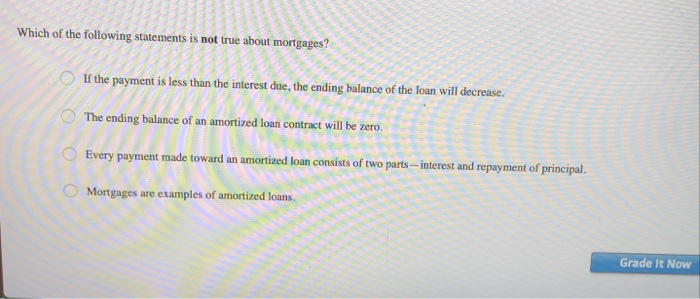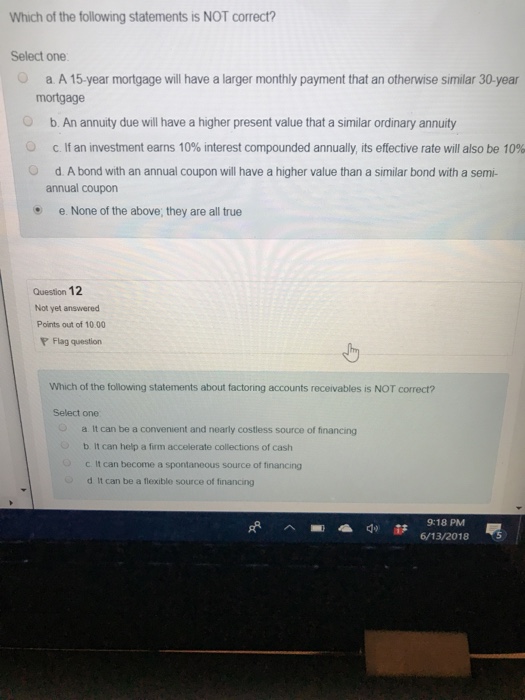Home mortgage payments are structured so that interest is paid off sooner, with the bulk of mortgage payments in the very first half of your home loan term approaching interest. As the loan amortizes, a growing number of of the home loan payment goes towards the principal and less toward its interest. Read on: Prior to you even make an application for a home loan, you need to get preapproved. When you sign, these become what you need to pay. With a fixed-rate home mortgage, your rate of interest remains the same throughout the life of the home mortgage. (Home loans typically last for 15 or 30 years, and payments should be made month-to-month.) While this implies that your rate of interest can never ever increase, it likewise implies that it could be greater on average than an adjustable-rate home mortgage in time.
Nevertheless, you typically get a certain number of years at the beginning of the loan duration throughout which the rates of interest is repaired. For example, if you have a 7/1 ARM, you get 7 years at the repaired rate after which the rate can be changed when each year. This implies your monthly mortgage payment could go up or down to represent modifications to the rate of interest.
If you're 62 or older and desire money to settle your home loan, supplement your income, or spend for health care expenses you may think about a reverse mortgage. It allows you to transform part of the equity in your house into money without needing to offer your home or pay extra https://dantecuyb890.tumblr.com/post/629456690269569024/h1-style-clearboth regular monthly costs.
A reverse home mortgage can use up the equity in your house, which suggests fewer possessions for you and your successors. If you do decide to look for one, examine the various kinds of reverse home mortgages, and contrast store prior to you pick a specific business - how adjustable rate mortgages work. Read on to read more about how reverse mortgages work, getting approved for a reverse home mortgage, getting the very best offer for you, and how to report any scams you might see.
The 30-Second Trick For How Do Arm Mortgages Work
In a mortgage, you get a loan timeshare remote jobs in which the lending institution pays you. Reverse home mortgages take part of the equity in your house and convert it into payments to you a type of advance payment on your home equity. The cash you get generally is tax-free. Generally, you don't have to repay the cash for as long as you live in your home.
Often that implies selling the house to get money to pay back the loan. There are 3 type of reverse mortgages: single function reverse home mortgages provided by some state and local government agencies, in addition to non-profits; proprietary reverse home mortgages private loans; and federally-insured reverse home loans, likewise known as House Equity Conversion Home Mortgages (HECMs).
You keep the title to your home. Rather of paying regular monthly mortgage payments, however, you get a bear down part of your house equity (how reverse mortgages work). The cash you get normally is not taxable, and it generally will not impact your Social Security or Medicare advantages. When the last enduring borrower passes away, offers the house, or no longer lives in the house as a primary residence, the loan has to be paid back.
Here are some things to consider about reverse home mortgages:. Reverse home mortgage lending institutions typically charge an origination cost and other closing expenses, along with maintenance costs over the life of the home mortgage. Some likewise charge mortgage insurance premiums (for federally-insured HECMs). As you get money through your reverse mortgage, interest is added onto the balance you owe each month.
The smart Trick of How Do Interest Payments On Mortgages Work That Nobody is Talking About
Most reverse home mortgages have variable rates, which are tied to a monetary index and modification with the market. Variable rate loans tend to provide you more options on how you get your cash through the reverse mortgage. Some reverse home loans mostly HECMs provide repaired rates, however they tend to need you to take your loan as a lump sum at closing.
Interest on reverse home loans is not deductible on income tax returns until the loan is settled, either partly or completely. In a reverse mortgage, you keep the title to your home. That indicates you are accountable for real estate tax, insurance, utilities, fuel, maintenance, and other expenses. And, if you do not pay your residential or commercial property taxes, keep house owner's insurance, or maintain your house, the loan provider may need you to repay your loan.

As an outcome, your lender may need a "set-aside" quantity to pay your taxes and insurance throughout the loan. The "set-aside" reduces the amount of funds you can get in payments. You are still responsible for keeping your house. With HECM loans, if you signed the loan paperwork and your partner didn't, in specific scenarios, your partner may continue to reside in the home even after you pass away if she or he pays taxes and insurance coverage, and continues to keep the home.
Reverse mortgages can utilize up the equity in your house, which implies fewer possessions for you and your beneficiaries. The majority of reverse home loans have something called a "non-recourse" clause. This Click for source implies that you, or your estate, can't owe more than the worth of your home when the loan becomes due and the house is offered.
Examine This Report about How To American Mortgages Work
As you consider whether a reverse home mortgage is best for you, also consider which of the 3 kinds of reverse home mortgage might finest suit your needs. are the least expensive option. They're provided by some state and local federal government companies, in addition to non-profit organizations, but they're not readily available all over.
For instance, the lender might say the loan might be used just to pay for house repairs, enhancements, or property taxes. The majority of property owners with low or moderate earnings can get approved for these loans. are private loans that are backed by the business that establish them. If you own a higher-valued house, you might get a bigger loan advance from a proprietary reverse home mortgage.
are federally-insured reverse home mortgages and are backed by the U. S. Department of Real Estate and Urban Advancement (HUD). HECM loans can be used for any function. HECMs and proprietary reverse mortgages may be more pricey than standard mortgage, and the upfront expenses can be high. That's important to consider, particularly if you plan to remain in your house for simply a brief time or borrow a little amount.
In basic, the older you are, the more equity you have in your home, and the less you owe on it, the more money you can get. Before applying for a HECM, you should meet with a therapist from an independent government-approved real estate therapy agency. Some lending institutions offering exclusive reverse home loans likewise need counseling.
